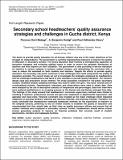Secondary school headteachers quality assurance strategies and challenges in Gucha district, Kenya

View/
Publication Date
2010-07-31Author
Florence Osiri Mobegi, A Benjamin Ondigi, Paul Odhiambo Oburu
Metadata
Show full item recordAbstract/
The desire to provide quality education for all Kenyan children was one of the major objectives of the
struggle for independence. The government is currently implementing measures to improve the quality
of education in secondary schools. The Kenya Education Staff Institute is strengthening capacities of
education managers and reviewing staffing norms in order to ensure the equitable distribution of
teachers and thus improve on their utilization. The government is also providing in-service education
for teachers in various subjects to enhance subject mastery, and rationalizing the curriculum with a
view to reduce the workload on both students and teachers. Despite the efforts to provide quality
education, the secondary sub-sector continues to face challenges that could compromise the quality of
education provided. The current study set out to investigate the strategies employed by headteachers
and the challenges headteachers had faced in their attempts to provide quality education. The research
design used was descriptive survey method. The study population consisted of 120 public secondary
schools. Stratified random sampling technique was used to select five girls’, four boys’ schools and 37
co-educational schools. Questionnaire, interviews and observations were used to obtain data. Data
were analyzed by the use of descriptive statistics of frequencies and percentages. Data from interviews
were analyzed qualitatively in an on-going process as the themes and sub-themes emerged from data.
The findings of the study showed that headteachers’ curriculum supervisory methods were limited to
checking of teachers’ professional records and gave less emphasize to departmental supervision, self
appraisal and class-visits. Financial constraint was revealed as the major challenge which impacted
negatively on physical facilities, teaching and learning materials, and teaching methods. Therefore, the
study concluded that headteachers employed inadequate methods for the supervision of teachers in
the sampled schools, preferring to rely on written records to establish the quality of education and
recommended that they should take up their roles as quality assurance officers and ensure that all
modern methods were employed in secondary schools. Further, headteachers should devise school
income generating projects to improve on financial problems that currently result in student
absenteeism, transfers and inadequate facilities
Collections
- Department of Psychology [216]
